|
|
|
Sort Order |
|
|
|
Items / Page
|
|
|
|
|
|
|
| Srl | Item |
| 1 |
ID:
115225
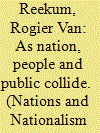

|
|
|
|
|
| Publication |
2012.
|
| Summary/Abstract |
In recent decades, Dutchness has become an intensely debated issue in Dutch public sphere. The article problematises the labelling of nations and nationalisms that occurs in public and academic understandings of these developments. Craig Calhoun's concept of discursive formation is argued to be more fruitful for understanding the recent contestations over Dutchness. Yet Calhoun's theory is itself in need of elaboration. Whereas Calhoun proposes to focus on the extent to which nations are constructed as publics of highly differentiated members, it is precisely this image that is central to an exclusionary discourse of Dutchness and enables the exclusion of cultural others from the Dutch imaginary. By analysing the enactment of Dutchness through discourses on citizenship, the surprising congruence of pluralism and exclusion in the Dutch context is explored.
|
|
|
|
|
|
|
|
|
|
|
|
|
|
|
|
| 2 |
ID:
110780
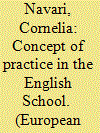

|
|
|
|
|
| Publication |
2011.
|
| Summary/Abstract |
The English School concept of practice is what Stephen Turner in The Social Theory of Practices calls a 'telic' notion. A telic practice is an activity seeking a goal 'which is conceived as a result of following certain general principles of procedure'. Examples of telic practices are playing a game of chess, holding a seminar, baptizing a baby or going fly-fishing. Such practices are carried out according to standards of excellence set forth in some tradition of interpretation. Maurice Keens-Soper has placed de Caillèires' De la maniere de negocier avec les souverains in a tradition of interpretation applied to diplomacy, and one that set standards. A practice in the English School sense is not a private idea: a commitment to communal standards is required if one is to talk meaningfully of a practice. A telic notion of practice may be contrasted with a causal notion. In the causal notion, a practice is a form of mentalist 'object' which impinges on behaviour. Pierre Bourdieu (1977), for example, is interested in practices as hidden convictions or habits shared by a group; his 'habitus' informs social action. Either as a kind of presupposition, or as a kind of mental trace, a practice in the causal sense disposes thought or action in a certain way. In this form, practices are not directly accessible, their existence must be inferred, and the means of accessing them are fraught with difficulties. A person engaging in a telic practice is guided by its standards rather than being caused to perform, and telic practices are directly accessible to empirical investigation.
|
|
|
|
|
|
|
|
|
|
|
|
|
|
|
|
| 3 |
ID:
091915
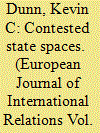

|
|
|
|
|
| Publication |
2009.
|
| Summary/Abstract |
Since the 'linguistic turn' in International Relations, it is assumed that agents like the state are always effects of discourse and should be 'decentered' rather than made the starting point for theory. Yet, most postmodern IR scholarship implicitly assumes a particular conception of the state. This article provides an explicit elaboration of that conceptualization, positing that the state is a discursively produced structural/structuring effect that relies on constant acts of performativity to call it into being. The constituting discourses on the state are never complete or closed, but are always contested, offering spaces for maneuver and resistance. Employing the example of African national parks, this article examines 'contested state spaces', those places where officially sanctioned state-making practices are successfully challenged, resisted and replaced by alternatives. The example of African national parks provides a useful way of interrogating state-making practices in the everyday life of international relations.
|
|
|
|
|
|
|
|
|
|
|
|
|
|
|
|
| 4 |
ID:
163101
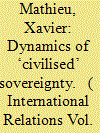

|
|
|
|
|
| Summary/Abstract |
Critical and post-colonial scholars have argued that a more complete account of sovereignty necessitates an exploration of the colonial experiences through which Western civilised identity was forged. But the way these ‘distant’ encounters were used in (and interacted with) the process of claiming sovereignty domestically has received less attention. This is surprising as critical scholars have revealed the existence of strong similarities between the domestic and international constructions of sovereignty (and in particular the necessary performance of a savage Other) and have emphasised how sovereignty transcends the domestic/international frontier and provides a crucial link between the two. As a response, this article develops an analysis of the construction of sovereignty that combines both the domestic and international colonial frontiers on which ‘civilised’ sovereignty relies. I use a large set of primary archives about France in the sixteenth century in order to explore how sovereignty depends on unstable colonial frontiers, that is, differentiations between the civilised and the savage, that are constantly contested and re-established. Combining the domestic and international colonial frontiers reveals how they interact and are used in order to reinforce the civilised identity of the Western ruler.
|
|
|
|
|
|
|
|
|
|
|
|
|
|
|
|
| 5 |
ID:
177893
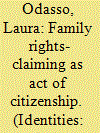

|
|
|
|
|
| Summary/Abstract |
Ethnographic and biographical research conducted with mixed-status couples and non-governmental organisations in France and Belgium provides insights into how the citizen partners of mixed-status relationships define and assert their family rights. In response to injustices suffered, from the state or from the migrant (non-citizen) partner, these citizens turned to organisations with contrasting discourses on marriage migration. These organisations encouraged them to participate in collective actions, and to give voice to their intimate experiences. Drawing on accounts of ‘intimate citizenship’, this article explores the citizenship-belonging nexus through lenses of performativity and intersectionality. Gender and ethnicity interact to influence interactions between citizen partners and the state, the tension between their virtual and actual social identities, and – ultimately – their assertions of citizenship, with personal status underpinning public claims. By speaking and acting in the name of their private lives and choices, these citizen partners affirm their (intimate) citizenship through its public performance.
|
|
|
|
|
|
|
|
|
|
|
|
|
|
|
|
| 6 |
ID:
157103
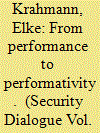

|
|
|
|
|
| Summary/Abstract |
Discussions about the legitimacy of private security companies (PSCs) in multilateral military interventions abound. This article looks at how the United States has sought to legitimize the outsourcing of security services to PSCs through performance-based contracting and performance assessments. Both mechanisms aim to demonstrate the effective provision of publicly desirable outcomes. However, the immaterial and socially constructed nature of security presents major problems for performance assessments in terms of observable and measurable outcomes. Performance has therefore given way to performativity – that is, the repetitive enactment of particular forms of behaviour and capabilities that are simply equated with security as an outcome. The implications of this development for the ways in which security has been conceptualized, implemented and experienced within US interventions have been profound. Ironically, the concern with performance has not encouraged PSCs to pay increased attention to their impacts on security environments and civilian populations, but has fostered a preoccupation with activities and measurable capabilities that can be easily assessed by government auditors.
|
|
|
|
|
|
|
|
|
|
|
|
|
|
|
|
| 7 |
ID:
172426
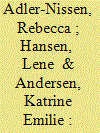

|
|
|
|
|
| Summary/Abstract |
How are images, emotions, and international politics connected? This article develops a theoretical framework contributing to visuality and emotions research in International Relations. Correcting the understanding that images cause particular emotional responses, this article claims that emotionally laden responses to images should be seen as performed in foreign policy discourses. We theorise images as objects of interpretation and contestation, and emotions as socially constituted rather than as individual ‘inner states’. Emotional bundling – the coupling of different emotions in discourse – helps constitute political subjectivities that both politicise and depoliticise. Through emotional bundling political leaders express their experiences of feelings shared by all humans, and simultaneously articulate themselves in authoritative and gendered subject positions such as ‘the father’. We illustrate the value of our framework by analysing the photographs of Alan Kurdi, a three-year-old Syrian-Kurdish boy who drowned in September 2015. ‘Kurdi’ became an instant global icon of the Syrian refugee crisis. World leaders expressed their personal grief and determination to act, but within a year, policies adopted with direct reference to Kurdi's tragic death changed from an open-door approach to attempts to stop refugees from arriving. A discursive-performative approach opens up new avenues for research on visuality, emotionality, and world politics.
|
|
|
|
|
|
|
|
|
|
|
|
|
|
|
|
| 8 |
ID:
173739
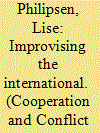

|
|
|
|
|
| Summary/Abstract |
In this article, I argue that the introduction of ethnography to International Relations has not taken full advantage of the potential of bringing these two fields together. Using international intervention as an example, I suggest that to bring out this potential we need to be more attentive to the classical virtues of ethnography. This means taking the subjects of our studies much more seriously, as people capable of making sense of and reacting to the structures of power they are embedded in. Here implementers tasked to put international policies into action in relation to a concrete context provide an overlooked source of knowledge. Using their experiences, reflections and ways of dealing with the concrete dilemmas that arise in their daily work enables us to analyse intervention as concrete relations of power that play out, affect and are mitigated by people in the field. Seeing knowledge as in this manner arising from the field provides a deeper knowledge that is necessary if we want to read intervention not only as an exertion of power from the international to the local, but as dynamically reshaped, resisted and made sense of in the field.
|
|
|
|
|
|
|
|
|
|
|
|
|
|
|
|
| 9 |
ID:
146084
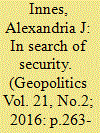

|
|
|
|
|
| Summary/Abstract |
This article explores a performative conceptualisation of security, foregrounding the experiences of an asylum seeker from Ghana in Greece, named Sonny. This article follows Sonny’s search for security, analysing both his journey to Greece and to refugee status (something that he was still waiting for) and the narrative through which he told his story to me. I argue that Sonny’s search for security illustrates how security might be produced by security-seeking actions performed by an agent other than the state. It accesses security on an ontological level that is performative in that security is constituted through actions, and is known through attending to experience. This security allows for incorporation of intersectional identities, subaltern identities and diverse experiences. The argument is situated in the context of migration and the migrant journey as offering unique scope for analysis in international relations that is capable of moving beyond the state. It briefly surveys the human security and feminist security literatures to elaborate on the value of conceptualising security as a practice and as an experience of everyday life, rather than an object to be obtained. To offer purchase on the performative conceptualization of security narrative analysis foregrounds Sonny’s agency to seek security, juxtaposing his feeling of security and process of security with the material security that was provided to him as an asylum seeker in Greece.
|
|
|
|
|
|
|
|
|
|
|
|
|
|
|
|
| 10 |
ID:
147319
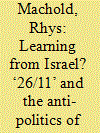

|
|
|
|
|
| Summary/Abstract |
This article calls for a greater emphasis on issues of politics and anti-politics within critical debates about transnational security governance in the metropolis. While scholars have documented the growing popularity of policy ‘models’ and ‘best practices’ in policing and urban security planning, we know little about what makes these schemes attractive to the officials who enroll in them. I take the government of Maharashtra’s decision to ‘learn from Israel’ following the 2008 Mumbai attacks (26/11) as an invitation to re-evaluate the relationships among policymaking, politics, and depoliticization. Focusing on references to Israeli security know-how as a ‘best practice’ by Maharashtra state officials, I explore how an association with Israel was used to negotiate the conflicts and controversies that followed 26/11. The article has two aims: first, it addresses how transnational policy schemes work anti-politically within particular local contexts. Second, it locates counter-terrorism policy as a form of performative politics, which is generative of policy problems. In doing so, the article helps to reclaim the political contingency of policy responses to terroristic violence and addresses the agency of policy actors in the global South.
|
|
|
|
|
|
|
|
|
|
|
|
|
|
|
|
| 11 |
ID:
193129
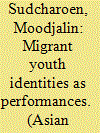

|
|
|
|
|
| Summary/Abstract |
This paper focuses on clothing policy in schools as a means to understand the Thai state’s management of diversity as well as the ways in which young migrants navigate their belongingness within the state discourse of nationalism. Because of its diverse migrant student population, a Thai state school proclaims itself a multicultural institution and instructs its students to wear ‘national clothes’ (chut pracam chat) every Tuesday. This policy enables migrant children to enter a cultural sphere where Burmese migrants are excluded, but, ironically, the very same clothes simultaneously stamp them as raeng-ngan tangdao, literally translated as ‘alien workers’. Young migrants devise strategies to downplay their alterity in public spaces and question the idea of belongingness and authenticity. Their dress practices reveal theatrical and fleeting performances of identity. But they neither fully assimilate to national standards nor assert completely distinct identities.
|
|
|
|
|
|
|
|
|
|
|
|
|
|
|
|
| 12 |
ID:
174765
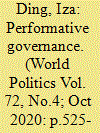

|
|
|
|
|
| Summary/Abstract |
The state often struggles to meet citizens’ demands but confronts strong public pressure to do so. What does the state do when public expectations exceed its actual governing capacity? This article shows that the state can respond by engaging in performative governance—the theatrical deployment of language, symbols, and gestures to foster an impression of good governance among citizens. Performative governance should be distinguished from other types of state behavior, such as inertia, paternalism, and the substantive satisfaction of citizens’ demands. The author illustrates this concept in the realm of environmental governance in China. Given the severity of China’s environmental pollution, the resulting public outcry, and the logistical and political challenges involved in solving the problem, how can the state redeem itself? Ethnographic evidence from participant observation at a municipal environmental protection bureau reveals that when bureaucrats are confronted with the dual burdens of low state capacity and high public scrutiny, they engage in performative governance to assuage citizens’ complaints. This study draws attention to the double meaning of “performance” in political contexts, and the essential distinction between the substantive and the theatrical.
|
|
|
|
|
|
|
|
|
|
|
|
|
|
|
|
| 13 |
ID:
142662
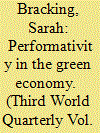

|
|
|
|
|
| Summary/Abstract |
This paper asks how far performativity in the Green Economy generates material or virtual assets. It examines the relationship between assets and their financial derivatives, asking how far the value of ‘carbon’ or ‘green’ can be directly attributed to its social and narrative construction. The paper draws on two case studies – one of the Clean Development Mechanism (CDM) in South Africa, the other of the global private green bonds market – to show that both public and private climate finance can generate virtual economic activity co-produced by processes of social valuation and accumulation proper. How reliant is the Green Economy on actual economic activity?
|
|
|
|
|
|
|
|
|
|
|
|
|
|
|
|
| 14 |
ID:
134370


|
|
|
|
|
| Summary/Abstract |
Afghanistan is often mentioned as a threat to the Central Asian states. Potential spillovers of violence, extremism, terrorism and dangers related to the drug trade are seen as significant security issues for the region. This article takes a different approach. Taking a performative view of statehood, we see state identities as socially constituted, partly by involvement in regional and global processes. From research on border management, the Northern Distribution Network, and various forms of bilateral cooperation between Afghanistan and the Central Asian states, we argue that Afghanistan has become an arena where the Central Asian states can participate. How the Central Asian states bordering on Afghanistan are treated as relevant participants, regardless of actual state capacity or the effectiveness of their policies, serves to constitute and confirm their sovereignty and relevance to the international community, and ultimately their statehood. By emphasizing the important state effects of their performance, our perspective differs from accounts of Central Asian states as either ‘weak’ or ‘strong’, and the tendency to depict Central Asian engagement in regional initiatives as mere window-dressing.
|
|
|
|
|
|
|
|
|
|
|
|
|
|
|
|
| 15 |
ID:
181664
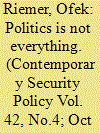

|
|
|
|
|
| Summary/Abstract |
Why do states deliberately disclose hard-earned intelligence? For political and operational reasons, Official Public Intelligence Disclosure (OPID) is often considered counterintuitive and ill-advised. However, as this practice proliferates in international affairs in recent years, extant scholarship emphasizes domestic political incentives for its employment. Drawing on interviews with policy, defense, and media figures in Israel, this article generates alternative perspectives. First, in keeping with the dictates of contemporary information and media environment, states engage in OPID as a performative act designed to enhance diplomacy and shape international agenda. Second, in the age of limited wars, instead of being amassed purely for large-scale escalation, selective disclosure of intelligence can be weaponized against adversaries whose operations and very survival depend on secrecy, so as to shape their behavior below the threshold of war. The article advances our understanding of the innovative ways in which intelligence can be strategically employed in the information age.
|
|
|
|
|
|
|
|
|
|
|
|
|
|
|
|
| 16 |
ID:
140511


|
|
|
|
|
| Summary/Abstract |
Algorithms, biometrics and body scanners, computers and databases, infrastructures of various kinds, ranging from what is commonly referred to as ‘hi-tech’ to ‘low-tech’ items such as walls or paper files, have garnered increased attention in critical approaches to (in)security. This article introduces a special issue whose contributions aim to further these approaches by questioning the role and political effects of security devices. It proposes an analytics of devices to examine the configuration and reconfiguration of security practices by attending to the equipment or instrumentation that make these practices possible and temporally stabilize them. The aim here is not to advance devices as a new unit of analysis, but to open new forays in ongoing debates about security politics and practices, by asking different research questions and developing new research angles. We start by outlining what is at stake when thinking of and analysing security practices through devices, or shifting from the language of technology and ‘technologies of security’ to security devices. The remainder of the article then specifies how an analytics of devices involves a more varied vocabulary of performativity, on the one hand, and agency, on the other.
|
|
|
|
|
|
|
|
|
|
|
|
|
|
|
|
| 17 |
ID:
176494
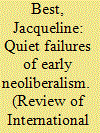

|
|
|
|
|
| Summary/Abstract |
While the last few decades of political economic history give the impression that the logic of neoliberalism is inexorable, this article argues that once we look further backwards and dig into recently declassified archives documenting the early days of neoliberal theory and practice, we find a messier picture. Economic policymakers in Thatcher and Reagan's administrations in the early 1980s did not set out to ‘fail forwards’ by generating a crisis that would enable a statist kind of neoliberalism. The key ideas that they drew on and the policies that they used to put them into practice sought to transform the economy indirectly, through a set of performative policy devices that they believed would generate a dramatic shift in people's inflationary expectations, lowering inflation without provoking a major recession. Archival records make it clear that these efforts were not only a failure, but also one that policymakers were acutely aware of at the time. By examining these quiet failures in economic policy, we can better understand how these governments simultaneously failed in their early efforts to introduce neoliberal economics and yet ultimately succeeded in transforming their economies in important respects – and in legitimising those transformations by narrating failure as a kind of inevitable success.
|
|
|
|
|
|
|
|
|
|
|
|
|
|
|
|
| 18 |
ID:
143643
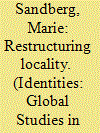

|
|
|
|
|
| Summary/Abstract |
Taking cities as analytical entry points for investigating practice, identity and place-making, this article explores the differential restructurings of locality in the twin cities of Görlitz and Zgorzelec on the German-Polish border. Drawing on ethnographic fieldwork, it shows how the local cities′ leaderships are attempting to wrestle the cities out of their downmarket positioning in the global economy. Deploying a performative research strategy of methodological relationalism, the article examines intersections between these cities′ strategies of situating local youth within urban regeneration and cross-border projects and local youth′s preferences for engaging in other kinds of place-making. By ‘seeing’ the cities in border regions through practices of place-making within the multiscalar processes of urban regeneration, new insights about ‘place’ are generated in which city branding is not the only kind of local restructuring to be acknowledged.
|
|
|
|
|
|
|
|
|
|
|
|
|
|
|
|
| 19 |
ID:
148677
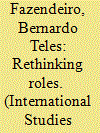

|
|
|
|
|
| Summary/Abstract |
This article argues for a practice of reflexive role ascription in International Relations (IR) to prevent actor normalization. Roles are useful and often applied in narratives to facilitate our understanding of particular actors or subject positions. Yet, recurrent and non-reflexive ascriptions give rise to normalization, shaping how actors become understood. Awareness of performativity, over-generalization, and over-determining roles would thus contribute to more nuanced understandings of actors and prevent limited yet insightful role ascriptions from becoming the norm. The article builds on two largely compatible turns in IR—the reflexive and narrative turns—with a view to enlarging the concept of role beyond the domain of interaction and drama. It thus reviews the manner in which roles have been conceptualized in IR and extends their definition. Then, by focusing on the notions of attribution, predication, and Judith Butler's performativity, the article propounds a two-level approach to reflexive role ascription–derived from Paul Ricoeur’s hermeneutics—that deters narratives and their roles from normalizing subject positions in IR.
|
|
|
|
|
|
|
|
|
|
|
|
|
|
|
|
| 20 |
ID:
101001
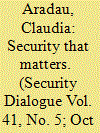

|
|
|
|
|
| Publication |
2010.
|
| Summary/Abstract |
Critical infrastructure protection is prominently concerned with objects that appear indispensable for the functioning of social and political life. However, the analysis of material objects in discussions of critical infrastructure protection has remained largely within the remit of managerial responses, which see matter as simply passive, a blank slate. In security studies, critical approaches have focused on social and cultural values, forms of life, technologies of risk or structures of neoliberal globalization. This article engages with the role of 'things' or of materiality for theories of securitization. Drawing on the materialist feminism of Karen Barad, it shows how critical infrastructure in Europe neither is an empty receptacle of discourse nor has 'essential' characteristics; rather, it emerges out of material-discursive practices. Understanding the securitization of critical infrastructure protection as a process of materialization allows for a reconceptualization of how security matters and its effects.
|
|
|
|
|
|
|
|
|
|
|
|
|
|
|
|
|
|
|
|
|